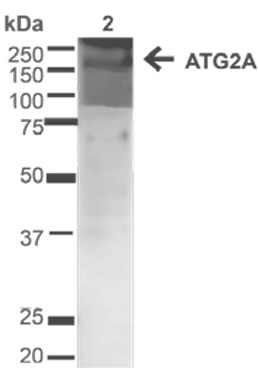Anti-Atg2A Antibody (23001)
Data
- -
- -
Antibody DetailsProduct DetailsReactive Species Human Host Species Rabbit Immunogen Synthetic peptide corresponding to amino acids at the C-terminus of human ATG2A. Product Concentration 1.0 mg/ml Formulation PBS, pH 7.4, 50% glycerol, 0.09% sodium azide. State of Matter Liquid Product Preparation Purified by peptide immuno-affinity chromatography Storage and Handling This antibody is stable for at least one (1) year at -20°C. Regulatory Status For in vitro investigational use only. Not for use in therapeutic or diagnostic procedures. Country of Origin USA Shipping Next Day 2-8°C Applications and Recommended Usage? Quality Tested by Leinco Immunoblotting: use at 1-2ug/mL. A band of ~213kDa is detected.
These are recommended concentrations. Endusers should determine optimal concentrations for their applications. Each investigator should determine their own optimal working dilution for specific applications. See directions on lot specific datasheets, as information may periodically change. DescriptionDescriptionSpecificity This antibody recognizes human Atg2A. Background Autophagy is a catabolic process that results in the degradation of bulk cytoplasmic contents within autophagosomes and lysosomes. Two human Atg2 homologs (Atg2A, Atg2B) are critical for autophagosome formation as silencing of both results in the accumulation of unclosed autophagic structures. Starvation-induced autophagy targets Atg2A to the initiation site of autophagosome biogenesis, where it associates with DFCP1, WIPI-1, and other autophagy- related proteins. Atg2 proteins also function in lipid droplet metabolism as depletion of both Atg2A and AtgB results in changes in the size, number, and distribution of lipid droplets. An increase in Atg2A expression during etoposide- and doxorubicin-induced apoptosis suggests that Atg2A may be a useful indicator of topoisomerase II inhibitor-mediated apoptosis. Function Lipid transfer protein involved in autophagosome assembly (PubMed:28561066, PubMed:31271352, PubMed:30952800). Tethers the edge of the isolation membrane (IM) to the endoplasmic reticulum (ER) and mediates direct lipid transfer from ER to IM for IM expansion (PubMed:31271352, PubMed:30952800). Binds to the ER exit site (ERES), which is the membrane source for autophagosome formation, and extracts phospholipids from the membrane source and transfers them to ATG9 (ATG9A or ATG9B) to the IM for membrane expansion (PubMed:31271352, PubMed:30952800). Lipid transfer activity is enhanced by WIPI1 and WDR45/WIPI4, which promote ATG2A-association with phosphatidylinositol 3-monophosphate (PI3P)-containing membranes (PubMed:31271352). Also regulates lipid droplets morphology and distribution within the cell (PubMed:22219374, PubMed:28561066). {PubMed:22219374, PubMed:28561066, PubMed:30952800, PubMed:31271352}. NCBI Gene Bank ID UniProt.org Research Area Autophagy References & CitationsTechnical ProtocolsCertificate of Analysis |



